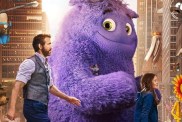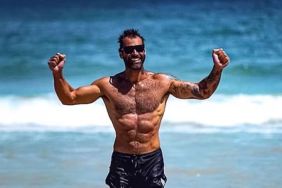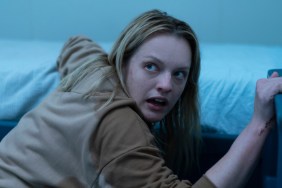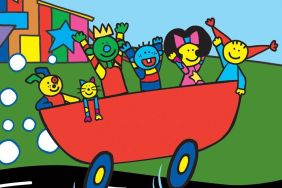On Wednesday, November 21, DreamWorks Animation and Paramount release Rise of the Guardians, an animated holiday movie based on the “Guardians of Children” book series by William Joyce.
The Guardians are the legendary fables kids believe in while growing up including North (Santa Claus), as voiced by Alec Baldwin, the Easter Bunny (Hugh Jackman) and the Tooth Fairy (Isla Fisher). As these Guardians face the growing threat of Pitch the Boogeyman (Jude Law), they must recruit the younger Jack Frost (Chris Pine) who has been struggling to get kids to believe in him.
Fans of animation and DreamWorks in particular will notice that it’s a very different movie for the animation studio, instilling all the fun and action they’re known for with a sense of emotion and sentimentality that will remind everyone what it was like being a kid believing in these mythic figures.
A few weeks back, ComingSoon.net had a chance to talk with the two writers involved with the project, original “Guardians” creator and Rise of the Guardians producer William Joyce, and screenwriter (and Pulitzer prize-winning playwright) David Lindsay-Abaire, who talked about what was involved with making what’s likely to be another beloved classic from DreamWorks Animation.
ComingSoon.net: I know your books and I know you have an animation background, having won an Oscar for your animated short
William Joyce: That was really fun.
CS: Was animation the first thing you were doing and then you transitioned into kid’s books? How did that happen?
Joyce: I went to film and art school and journalism. I knew I wanted to do at least two of those, but I really loved movies so much, and I could draw, and so I was always drawing stories, right? I never thought I’d get into animation actually, because in film school I was just like, “God, animation is so hard. I don’t know if I want to do something that (hard)
I don’t know if I’ll have that temperament.” So I wanted to go into live action, but everybody kept wanting me to do animation, so I was like, “All right.” The first animated project I worked on, luckily, was “Toy Story.” John Lasseter had seen my books and called me in person, and early, early in the development of “Toy Story,” introduced himself. I didn’t know who he was. (Laughs)
CS: At that time, not everyone knew who he was.
Joyce: No, and I said, “Well, can you send me your stuff?” That’s hysterical to this day, so he was like, “Sure.” So he sends me these VHS tapes–this how long ago–of “Tin Toy” and “Knick Knack” and “Luxo Jr.” I was like, “Oh my God, this is what I’ve been waiting for,” because animation at that point at Disney had become just to me the saddest thing. I mean, “Black Cauldron” and they just were–
CS: I guess before the Disney resurrection with “The Little Mermaid” and “The Lion King,” right?
Joyce: Right. I loved “Pinocchio,” I loved “Bambi,” I loved those. He sent me that and I went, “Wow, this is what animation can be. This looks astonishing. This doesn’t look like something you made, it looks like something you dreamt.” So I was like, “Count me in.” I started working on “Toy Story” early on, so I got to learn a lot more about how it worked, and it demystified a lot of it for me, and I realized it was still probably the hardest thing in the world you could do, but it was something I could see a way that I can do this. So then that was that, and I’ve been fiddling around with it and enjoying myself in that sandbox ever since.
CS: With a movie like this, you have a lot more animators and people skilled in various aspects of animation, it’s not just you and a computer which is much harder, I assume.
Joyce: Well, it is, and I mean, I have such an interesting life now because I can sit and have a totally quiet experience of writing something and illustrating it. Then walk out of my office and go give notes on animation or whatever we’re working on at Moonbot, and then you get on the phone or VTC with DreamWorks and look at what’s going on and give notes. Then occasionally I roll up my sleeves and do some of it myself, either just because I want to, or to make the point or to illustrate what I’m trying to get across. What I didn’t expect to develop in the course of my life is the ability to guide people. (laughs) I apparently have a knack for it and I enjoy it. That’s essential if you’re going to do animation. I mean, you can’t do all of it, but if you know what you want or you know what you don’t want, then that’s very vital. If you can communicate that to the people you’re working with and then all will be well.
CS: This is different from most situations, since often, when authors option the rights to their work, they don’t have the time or knowledge in the world of filmmaking to be involved, so how long ago did you go down this road with “Rise of the Guardians?”
Joyce: Day One.
CS: But how long ago was that? Four years ago? More?
Joyce: No, I think it’s a little over five years, and maybe right on the cusp of six. Like Christina had been talking about, we can’t quite find the exact date when they all flew out on the DreamWorks jet to Shreveport to talk to me. It was Jeffrey and Bill Damaschke and Christina (Steinberg) and Kristine Belson and a couple of other people and we spent a whole day talking about how this would be a movie. There was another studio bidding on it to do it live action, and so they were both trying to prove who would be the better steward of it. They both said, “You can do the books. You can direct it if you want to. You can be involved if you want to.” I had such a tough decision and the other guys were offering considerably more money. I was just like, “Ah, what do I do?” I sat in the kitchen with my wife and I said, “All right, we’re going to flip,” because I made a list like of pluses and minuses. It’s just even, but it comes down to animation or live action and who do I really think is going to come through? Both places said we’re committed to your vision, you know, dah-dah-dah-dah. All I wanted to do at the end of the day was make sure it was good. So I flipped a coin and said, “Elizabeth, I’ll flip a coin. Heads, it’s DreamWorks, tails it’s the other guys.” It went tails. I went, “Okay, let’s do best two out of three.” So 11 times it went heads. (Laughs)
CS: I think you had your decision made already before you flipped the coin.
Joyce: Well, I realized it finally and I threw (the coin) across the room and was like, “F*ck it. We’re going to DreamWorks.” (Laughs)
CS: You and David had met while you were both working on “Robots” so did you come up with the idea of having him write this?
Joyce: No, that was Bill Damaschke’s idea. I went, “Damn, that’s good. That would be great.” And I said, “Yeah, he likes to work alone. He likes not to be bothered.” Bill said, “Well, that’s what we’re going to do because we’ve been bothering our other screenwriters too much. We’ve been standing over them. I said, “Well, I think David can crack it.” And he did. Man, he did such a good job. F*cking sh*t, he did such a good job. He sorta corralled
we had so many ideas and there are so many characters and there’s so many ways to go. We had settled on that it would be Jack’s story and Jack coming in to being one of the Guardians. We had settled on Jack being young. Initially, in in my early versions, he was an adult and it wasn’t working. One story guy one day in a meeting suggested he be a kid and that totally opened it up. I thought to myself, “Oh my God, it’s Peter Pan, except it’s Peter Pan who doesn’t want to be Peter Pan, and questions why he is this way.” That’s much more powerful. So we had that, but it was still a mess, and then there were just too many people trying to figure it out and we knew that we were kind of in a juncture. David came in and we left him alone and he read all the original material I’d put together just laying out the world and had the oath and their personalities and what their lands were like, and all that kind of stuff, and their origins, except for this revised origin for Jack. He came back and brought all the simplicity and order that we needed, which is the hardest. The more I work in movies, the more I come to understand that achieving simplicity is the most difficult thing and the most essential thing in making these films. Stories are reasonably simple. You can hang all the complexity you want, but you have to have a simple just throughline to hang all the pretty stuff on. David was the one that really got us there.

Next, we have our interview with screenwriter David Lindsay-Abaire, who we previously spoke to for the movie adaptation of his stage play Rabbit Hole, starring Nicole Kidman, and who had the unenviable task of taking all the ideas by Joyce and the creative at DreamWorks Animation and trying to whittle it down into a cohesive story.
ComingSoon.net: We spoke briefly following the Bryant Park presentation, so I know a little bit about the movie. How long ago did you actually get involved with this? Who was the person that originally contacted you and said, “Hey, we want to turn William Joyce’s books into a movie”?
David Lindsay-Abaire: It was probably two-and-a-half years ago, maybe even three, but it was Bill Damaschke, who’s head of production. He was the lead producer on “Shrek The Musical,” so that’s how I knew Bill and Jeffrey because I worked on “Shrek The Musical” for about six years. Bill said, “I have your next project.” So I said, “I don’t know Bill, really? What’s the next project?” He’s like, “Just come. Christina (Steinberg) and I want to show you the boards and pitch you the story.” Once they did that, I said, “Is DreamWorks really going to make this movie, because the ideas are bigger. There’s nothing overtly wacky about it.” I crossed my fingers and said, “All right, sign me up. If that’s the movie you want to make, then I want to do that.”
CS: Is it worrying when someone tells you that, “Oh, this is your next project”? If it’s something you hate, then you have to let them know.
Lindsay-Abaire: (laughs) I’m flattered when anybody ever wants to pitch a project to me. No, but it was great. Bill said, “Look, this is why I think you’re right for it, because we hope it’s funny, we hope it’s epic, but there’s a really deep emotion to this story that we think you can mix all of those things together,” and that was the thing that appealed to me most. It’s really about hope versus despair, fear versus wonder, these big, big things–you don’t want to get too esoteric or serious about it, but if you then have action and humor and to have big ideas, then that’s a great kids movie.
CS: Did you know Bill from when you did “Robots?” I know he was involved with that.
Lindsay-Abaire: Yeah, yeah. I mean, I haven’t seen Bill since. I mean, that was a whole other process, but I stepped off that project when they decided to do something very different with it. It’s a fine movie. My kids think it’s very cute, but it’s not the movie that they hired me to write. So, I wrote that movie. Everybody seems very happy and they went to the studio industry and said, “Oh, why is it like this?” Anyway, so Bill and I had a lot of interactions during “Robots,” and we’ve now debriefed about it. (Laughs) So it was very cleansing to finally say, “So how was that for you?”
CS: Obviously, they worked out the characters and who they are but did they have any kind of plot or general story beats you had to work from?
Lindsay-Abaire: The only plot that was really in place was it had been decided–and I totally embraced it–that it was mostly going to be Jack Frost’s journey. It was about how does Jack Frost become a Guardian and learn to believe in himself. That was basically there, I think. God, it was so long ago.
CS: A few years for an animated movie is not that long, actually. Sometimes it takes five years or more.
Lindsay-Abaire: No, I know, but animation years are like dog years a little bit because there’s so many storyboards and you’re constantly putting it up. It’s like going to the optometrist, really. “Is this right or is that right? Is this right or is that right?” That’s the best thing about it and the worst thing about it, because you’re always reassessing, which can be very difficult for a writer. But at the same time, if everybody’s making the same movie, then it is getting clearer and sharper and more to the story that you’re meant to tell. That doesn’t always happen, you know? Sometimes that process, things can go off the rails, but luckily with this version, it really did get better and better. But you know, there was a year in there where it felt like, “Yikes
what are we doing?”
CS: Animation’s gotta be one of the strangest filmmaking genres, since there’s no defined preproduction, shooting, post production phase. It’s all at once. I imagine you could be writing some lines a month before it’s finished.
Lindsay-Abaire: Oh, very much, yeah. There are some scenes that were finished well before anything was even started, you know? The scene where the little boy Jamie finally sees Jack for the first time, that was one of the very first scenes that I wrote, and the storyboard artist said, “Yup, we know how to do this.” It was in storyboard. We recorded it and it was put into production a year and a half ago. Meanwhile, other scenes are always in various stages, and somebody will say, “Okay, this has to go into production now. Are we set with this one because we can’t touch it again? So whatever changes we’re going to make, we can only make it in these 12 scenes that remain, in these 10 scenes that remain, we can only make changes in these five scenes.” I mean, in a way, we were making little dialogue changes still a month ago.
CS: Is it tough going from doing something like “Rabbit Hole,” which is such a personal thing–you wrote the play, you did the movie and you were very involved every step of the way–to doing something like this where you really are working as a writer for hire and you have to get a lot of ideas from a lot of different places and kind of make it all work in some ways?
Lindsay-Abaire: Yeah, yes, it’s harder, but it’s a totally different animal. It would be hard if I didn’t accept that it was a different animal. Going into it I knew, “Don’t become too precious about anything. This isn’t necessarily your vision alone. It can never be your vision alone.” In that way, it opened me up and just put me in a different place. Like, this is very collaborative, just take whatever idea is the best idea and you’re going to have to slug it out. If there’s something that you truly believe in, then you have to fight for it and show everybody why it needs to be in the movie, or you need to step back and say, “Why aren’t they connecting with it? Maybe they have a better idea.” That was just the process for two-and-a-half years, and that can be incredibly difficult, of course, because everybody’s fighting for whatever they think the movie is. But two-and-a-half years later, all this stuff that didn’t belong in the movie fell away.
CS: And it works.
Lindsay-Abaire: I think so, yeah, yeah. I mean, there are moments where I feel like “That’s exactly like I imagined” – like the quieter moments in the movie, like again, when Jamie believes in Jack for the first time and when Pitch seduces Jack on the iceberg when they’re alone. There are quiet, little scenes that were the scenes that I wrote from the very beginning that I can’t say it’s totally me, it’s not, but it’s the closest to what I wrote. There are other parts that I’m all over it, but everybody’s all over it. I mean, that’s the thing about DreamWorks, they’re incredibly collaborative, with everybody’s voice counts.
Rise of the Guardians opens nationwide in 2D, 3D and 3D IMAX theatres on Wednesday, November 21.









